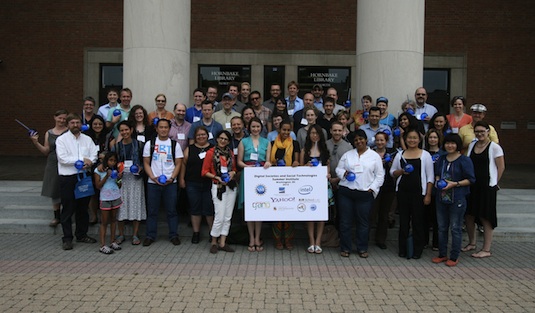

Photo: Brian Keegan
GRAND was a proud sponsor of the 2013 Digital Societies and Social Technologies Summer Institute at the University of Maryland, College Park (July 28-August 1, 2013). Jointly organized by the Consortium for Science of Sociotechnical Systems (CSST) and the Summer Social Webshop, the event brings together a community of researchers from academia and industry focused on the problems and opportunities arising from the interplay of social and technological systems which span individuals, groups, organizations, and societies. This year, GRAND organized a delegation of three doctoral students to attend the event: Naureen Nazam (Dalhousie), Claude Fortin (SFU) and Farjana Eishita (Saskatchewan). The following is part of a three-part blog series about their experience.
By Naureen Nizam
Participating at the Digital Societies and Social Technologies Summer Institute 2013 (DSST 2013) at the University of Maryland, College Park was an enjoyable and valuable learning experience for me. The experience is largely attributed to the way the DSST was designed. The program supported planned activities (spotlight sessions, hands-on sessions, talks, etc.) and ad-hoc activities (un-conferences) which facilitated networking and learning.
I found the spotlight sessions to be extremely useful, as they allowed me to discuss my research with fellow researchers in the field of Human Computer Interaction (HCI), social computing and information visualization. I received feedback on my research and on my approach to answering the research questions. This was extremely valuable given the current stage of my research.
Sessions conducted by Kevin Mentzer, M. Lynne Markus, Shaila Miranda, Noshir Contractor, Matt Germonprez and Michelle Carter were informative and I see myself applying the concepts learned in my own research. Patrick Meier’s talk on Crowdsourced Verification for Crisis information was fascinating as he described a joint project by Masdar and QCRI called Veri.ly - an online platform designed to collectively evaluate the credibility of rapidly crowdsourced evidence.
All the above events make up for my rewarding experience at DSST 2013. Thanks to GRAND NCE for giving me this opportunity.